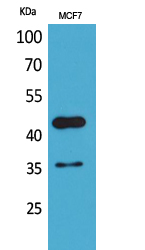- 靶点:
- Angptl4
- 简介:
- >>PPAR signaling pathway;>>Cholesterol metabolism
- 基因名称:
- ANGPTL4
- 蛋白名称:
- Angiopoietin-related protein 4
- Human Gene Id:
- 51129
- Human Swiss Prot No:
- Q9BY76
- Mouse Gene Id:
- 57875
- Mouse Swiss Prot No:
- Q9Z1P8
- Rat Gene Id:
- 362850
- Rat Swiss Prot No:
- Q6TMA8
- 免疫原:
- The antiserum was produced against synthesized peptide derived from the Internal region of human ANGPTL4. AA range:301-350
- 特异性:
- Angptl4 Polyclonal Antibody detects endogenous levels of Angptl4 protein.
- 组成:
- Liquid in PBS containing 50% glycerol, 0.5% BSA and 0.02% sodium azide.
- 来源:
- Polyclonal, Rabbit,IgG
- 稀释:
- IHC: 100-300.WB 1:500 - 1:2000. ELISA: 1:20000.. IF 1:50-200
- 纯化工艺:
- The antibody was affinity-purified from rabbit antiserum by affinity-chromatography using epitope-specific immunogen.
- 浓度:
- 1 mg/ml
- 储存:
- -15°C to -25°C/1 year(Do not lower than -25°C)
- 其他名称:
- ANGPTL4;ARP4;HFARP;PGAR;PP1158;PSEC0166;Angiopoietin-related protein 4;Angiopoietin-like protein 4;Hepatic fibrinogen/angiopoietin-related protein;HFARP
- 实测条带:
- 45kD
- 背景:
- This gene encodes a glycosylated, secreted protein containing a C-terminal fibrinogen domain. The encoded protein is induced by peroxisome proliferation activators and functions as a serum hormone that regulates glucose homeostasis, lipid metabolism, and insulin sensitivity. This protein can also act as an apoptosis survival factor for vascular endothelial cells and can prevent metastasis by inhibiting vascular growth and tumor cell invasion. The C-terminal domain may be proteolytically-cleaved from the full-length secreted protein. Decreased expression of this gene has been associated with type 2 diabetes. Alternative splicing results in multiple transcript variants. This gene was previously referred to as ANGPTL2 but has been renamed ANGPTL4. [provided by RefSeq, Sep 2013],
- 功能:
- caution:The sequence shown here is derived from an Ensembl automatic analysis pipeline and should be considered as preliminary data.,disease:Found to be highly expressed in the early stages of collagen-induced arthritis (CIA).,disease:Produced in ischemic tissues in conditions such as critical leg ischemia. In tumors, ANGPTL4 could be produced in the hypoxic areas surrounding necrotic regions. High levels could be produced in tumor cells of conventional renal cell carcinoma. This molecule therefore seems to be a marker of conventional renal cell carcinoma.,disease:Serum levels of ANGPTL4 are significantly lower in patients with diabetes type 2 than those in healthy subjects, suggesting that decreased ANGPTL4 could be a causative factor of this disease.,function:Protein with hypoxia-induced expression in endothelial cells. May act as a regulator of angiogenesis and modulate tumorgenesis.
- 细胞定位:
- Secreted . Secreted, extracellular space, extracellular matrix . The unprocessed form interacts with the extracellular matrix (PubMed:17068295, PubMed:21398697). This may constitute a dynamic reservoir, a regulatory mechanism of the bioavailability of ANGPTL4 (Probable). .
- 组织表达:
- Detected in blood plasma (at protein level) (PubMed:29899519). Detected in liver (PubMed:10698685). Detected in white fat tissue and placenta (PubMed:10866690). Expressed at high levels in the placenta, heart, liver, muscle, pancreas and lung but expressed poorly in the brain and kidney.
HIF-1α regulates osteoclastogenesis and alveolar bone resorption in periodontitis via ANGPTL4. Feiwu Kang IF,WB Mouse 1:100 periodontitis tissue RAW264.7 cell,osteoblasts
货号:YT5174
- June 19-2018
- WESTERN IMMUNOBLOTTING PROTOCOL
- June 19-2018
- IMMUNOHISTOCHEMISTRY-PARAFFIN PROTOCOL
- June 19-2018
- IMMUNOFLUORESCENCE PROTOCOL
- September 08-2020
- FLOW-CYTOMEYRT-PROTOCOL
- May 20-2022
- Cell-Based ELISA│解您多样本WB检测之困扰
- July 13-2018
- CELL-BASED-ELISA-PROTOCOL-FOR-ACETYL-PROTEIN
- July 13-2018
- CELL-BASED-ELISA-PROTOCOL-FOR-PHOSPHO-PROTEIN
- July 13-2018
- Antibody-FAQs
- 产品图片

- Western Blot analysis of MCF7 cells using Angptl4 Polyclonal Antibody. Secondary antibody(catalog#:RS0002) was diluted at 1:20000

- Immunohistochemical analysis of paraffin-embedded Human testis. 1, Antibody was diluted at 1:100(4° overnight). 2, High-pressure and temperature EDTA, pH8.0 was used for antigen retrieval. 3,Secondary antibody was diluted at 1:200(room temperature, 30min).

- Western blot analysis of lysate from MCF7 cells, using ANGPTL4 Antibody.



